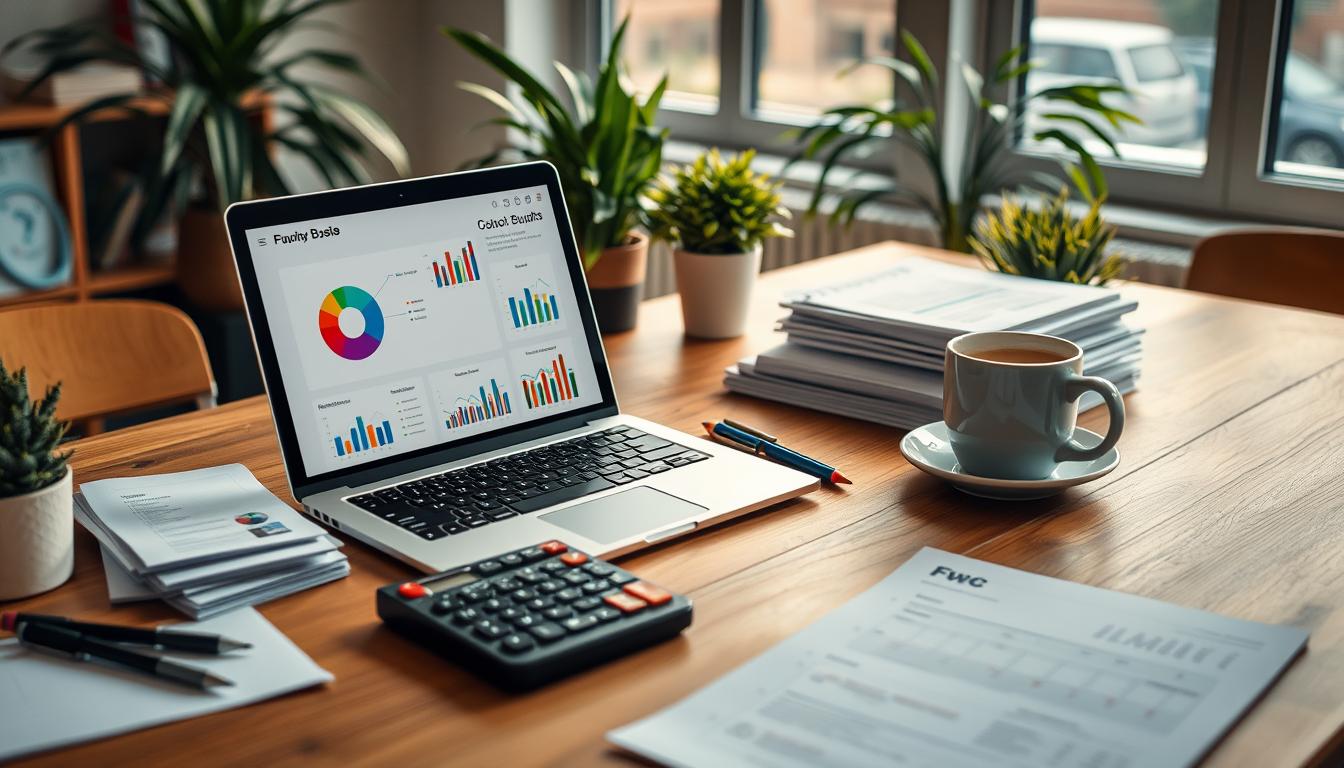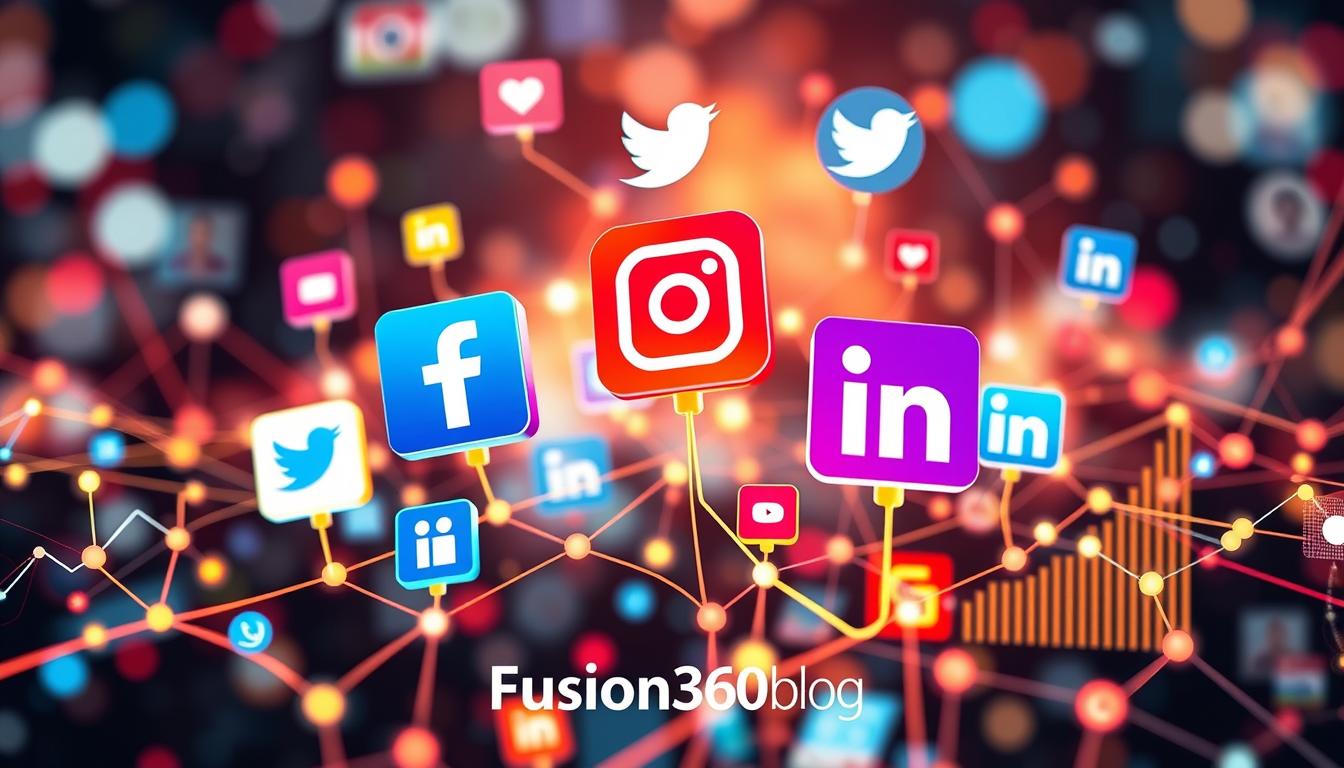Imagine a life where money worries are gone. Your money works for you, not the other way around. A personal budget is the key to financial freedom and dreams. I’ve struggled with budgeting but found it’s life-changing when you manage your money well.
Key Takeaways
- Budgeting can help you pay down debt and save for the things you want.
- A well-structured budget can reduce financial stress and build confidence.
- Budgeting can help you prepare for emergencies and achieve your long-term goals.
- Tracking your expenses and adjusting your spending can lead to significant financial gains.
- Automating your savings and investments can help you stay on track with your budget.
The Importance of Budgeting
Budgeting is key to managing your money. It helps you control your finances and reach your money goals. By making a budget, you see where your money goes. This helps you spend less and use your money wisely.
Gaining Control Over Your Finances
A good budget lets you pay bills on time. It also helps you save money for what you want. LendingTree says the average credit card debt is $7,236 in Q3 of 2024. Budgeting helps manage this debt.
With a budget, you can focus on what’s important. It gives you confidence and security in your finances.
Achieving Financial Goals
Budgeting helps you save for retirement. In 2024, you can put up to $23,000 in a 401(k) if you’re under 50. It also helps you save for emergencies, covering three to six months of living costs.
By budgeting, you make smart money choices. This leads to a more secure financial future.
Budgeting is vital for controlling your money, reducing debt, and reaching your goals. A good budget helps you manage your finances well. This leads to financial stability and freedom.
What is a Budget?
A budget is a tool to help you manage your money. It’s a plan that shows your monthly income and expenses. You identify what’s important, track your money, and adjust your plan as needed.
Defining a Budget
A budget is like a map for your money. It shows where your money comes from and where it goes. With a detailed budget, you can decide how to use your money wisely and reach your financial goals.
The Components of a Budget
The main parts of a budget are:
- Monthly Income: Your money from jobs, wages, or other sources.
- Fixed Expenses: Costs that stay the same, like rent or car payments.
- Variable Expenses: Costs that change, like food or entertainment.
- Savings and Investments: Money set aside for goals, emergencies, or investments.
Tracking these helps you understand your finances. You can then make smart choices about your money.
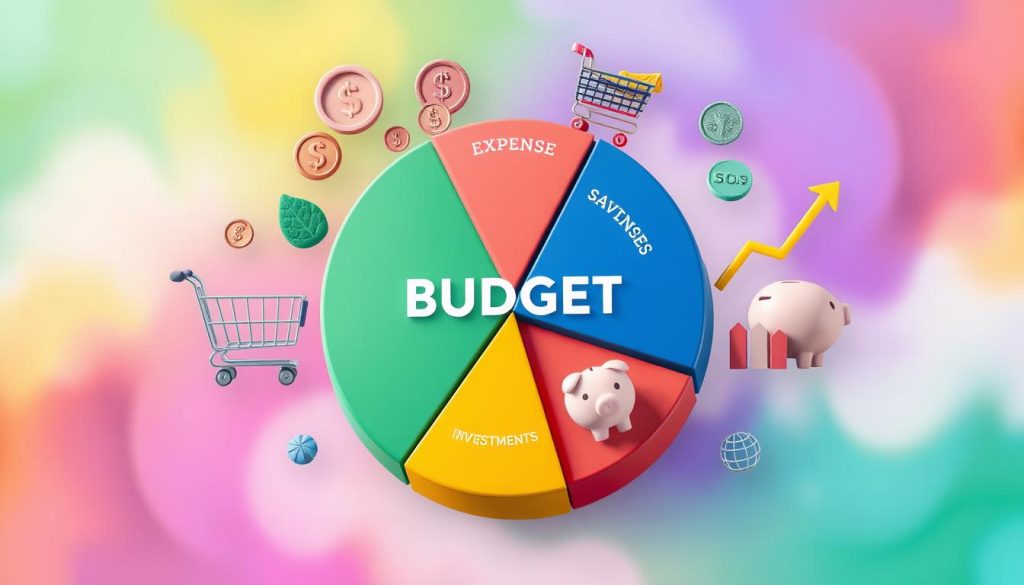
Budgeting is a strong tool for managing your finances. It helps you use your money wisely to meet your needs and goals.
How to Create a Personal Budget
Creating a personal budget is key to managing your money. It helps you reach your financial goals. You need to estimate your monthly income and list your expenses.
Step 1: Estimate Your Monthly Income
First, add up all your monthly money. This includes paychecks, child support, and any other regular income. Be careful and be a little conservative.
For example, let’s say you make $6,500 a month. This comes from:
- Primary job: $5,000
- Freelance work: $1,000
- Part-time job: $500
Step 2: Identify and Categorize Expenses
Then, list your monthly expenses. These are bills that stay the same, like rent or car payments. And there are expenses that change, like food or fun.
Looking at your bank and credit card statements helps. This way, you can see where your money goes. It helps you find ways to save.
For example, your monthly expenses might be:
| Expense | Amount |
|---|---|
| Groceries | $700 |
| Electricity | $130 |
| Water | $60 |
| Mortgage | $1,450 |
| HOA Fees | $50 |
| Gasoline | $180 |
By knowing your income and expenses, you can make a budget. This is the first step to managing your money well.
Differentiating Fixed and Variable Expenses
When you make a budget, knowing the difference between fixed and variable expenses is key. Fixed expenses stay the same every month. These include rent, car loans, and insurance. They are easy to plan for because they don’t change.
Variable expenses change from month to month. These are things like groceries, gas, and entertainment. Even though they’re not as predictable, managing them well can help you reach your money goals.
Sorting your expenses into fixed and variable groups helps you see where you spend money. The 50/30/20 rule is a good guide. It says to spend 50% on fixed needs, 30% on wants, and 20% on savings.
Knowing the difference between fixed and variable expenses helps you make a better budget. A good budget fits your money goals. You should check and change your budget often to keep it right for you.
| Fixed Expenses | Variable Expenses |
|---|---|
| Rent or mortgage payments | Groceries |
| Car loans | Utility bills |
| Insurance premiums | Dining out |
| Student loans | Entertainment |
| Subscription services | Gasoline |
By sorting your expenses, you can make a detailed budget. This helps you manage your money well and reach your goals.
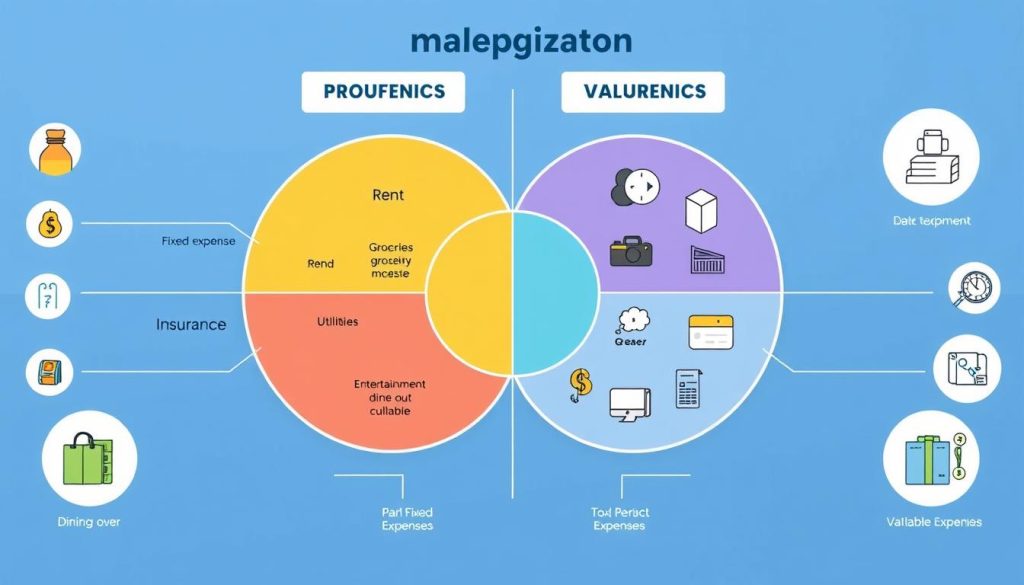
Setting Financial Goals and Priorities
Setting clear financial goals is key to a good budget. Think about your short-term, mid-term, and long-term goals. Short-term might be saving for a vacation or an emergency fund.
Mid-term goals could be getting life insurance or disability income. Long-term goals might be saving for retirement or a house.
After setting your goals, it’s time to prioritize your expenses. Save 10-20% of your income for savings and investments. Use the rest for essential and fun expenses.
This way, you can make smart choices and reach your financial dreams.
- Start an emergency fund with $500 to $1,000. Then aim for three to six months’ living expenses.
- Plan to pay off high-interest debt. Use methods like the debt avalanche or snowball to clear balances.
- Save for retirement early. Use compound interest to grow your retirement account, like a 401(k) or IRA.
Review and update your financial goals yearly. This keeps them in line with your changing needs and goals. By budgeting for your goals, you’ll get closer to financial security and happiness.
“The first step towards getting somewhere is to decide that you are not going to stay where you are.” – J.P. Morgan
How to create a personal budget that works
Creating a good personal budget is key to financial stability. It helps you save for big things like a house or pay off debt. A smart budget lets you control your spending better.
To make a budget that works, know your income and expenses first. Find out how much money you take home each month. Then, sort your spending into fixed costs (like rent) and variable costs (like food).
- First, figure out how much money you make each month. This includes your main job and any side work.
- Then, sort your spending into fixed and variable costs. Look for ways to cut back on variable spending.
- Set financial goals, like saving for emergencies or paying off debt. Decide what’s most important to you.
- Keep track of how you spend money each month. Make changes to your budget as needed.
- Stick to your budget and keep building good money habits. This will help your budget stay effective.
By following these steps, you’ll make a budget that meets your financial goals. It will help you manage your personal finance management well.
| Budgeting Strategy | Description | Potential Benefits |
|---|---|---|
| 50/30/20 Rule | Uses 50% for needs, 30% for wants, and 20% for savings and debt. | It’s a simple way to budget and ensures you save enough for the future. |
| Zero-Based Budgeting | Every dollar is assigned to an expense, savings, or debt repayment. | It helps you spend intentionally and use every dollar wisely for your goals. |
| Envelope Budgeting | Uses cash or digital envelopes for different spending categories. | It’s a hands-on way to budget that helps avoid overspending. |
Choose any budgeting strategies you like. The main thing is to create an effective personal budget that fits your financial situation. It should help you reach your creating an effective personal budget goals.
Tracking Your Spending
To budget well, you must watch your spending closely. Use a pen, a budget app, or a spreadsheet to track your daily costs. At month’s end, compare your spending to your budget. This helps you find where you can save more.
This tracking and adjusting is key. It keeps your budget working for you, no matter your financial goals.
Tools and Methods for Expense Tracking
Many tools and methods can help you track your spending. Here are some popular ones:
- Budgeting Apps: Apps like Quicken, YNAB, or Mint track your spending automatically. They give updates, templates, and reports on your spending.
- Spreadsheets: Make a custom spreadsheet with Excel or Google Sheets. It lets you tailor categories and see your spending patterns.
- Pen and Paper: Use a notebook or ledger for a hands-on way to track expenses. It’s great for those who like writing things down.
Choose the method that works best for you. The important thing is to track your spending regularly. This way, you can spot areas to improve and make smart choices for your personal finance management goals.
![]()
“Tracking your spending is the foundation of effective budgeting. It’s the only way to truly understand where your money is going and make informed decisions to reach your financial goals.”
Adjusting Your Budget
Budgets can change – they should be reviewed and adjusted often. At the end of each month, check if you spent as planned. See if you met your savings goals.
If you had unexpected expenses or leaks, adjust your budget. Make changes to your categories and amounts.
If you got a raise or bonus, think about allocating those funds differently. This way, you can focus on what’s important to you now. Regularly reviewing and revising your budget helps you stay on track financially.
Adapting Your Budget Plan
Changing your personal budget is key to keeping control of your money. Here are some tips to help you optimize your budget:
- Track your spending to find ways to save.
- Change your budget categories if your income or expenses change.
- Use bonuses or tax refunds for savings or paying off debt.
- Update your budget at the start of each month to match your current finances.
A good budget changes with your life. By regularly adjusting and optimizing your personal budget, you can manage your money well. This helps you reach your financial goals.
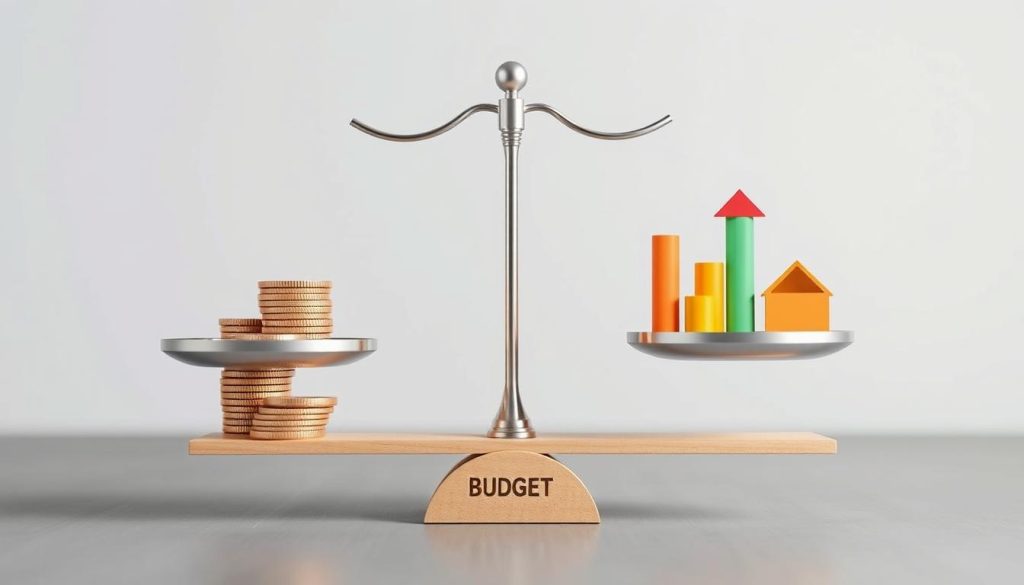
“A budget is telling your money where to go instead of wondering where it went.” – Dave Ramsey
Automating Savings and Investments
Automating your savings and investments can change your financial game. Set up automatic transfers from your checking to savings and investments. This way, your money goes to your goals before you can spend it.
This “pay yourself first” method makes saving easy. It helps you grow wealth without always checking your accounts. Automating your money means no more guessing about your budget.
- Automating finances helps pay bills on time. This avoids late fees and keeps your credit score high.
- Automating savings means setting aside money regularly. It could be weekly or monthly for savings or retirement.
- Changing bill due dates can make paying easier. It helps control your money better.
To start, set up automatic transfers to your savings and investments. You can take a part of your paycheck or a fixed amount regularly. Also, automate your bills like utilities and loans to make managing money simpler.
Success in automating savings and automatic investments depends on finding what works for you. Check and change your automated plans as your money goals change.
“Automating your finances takes the guesswork out of budgeting and helps you stay on track with your personal finance management.”
Using automation, you can easily save, invest, and control your money future. Start automating your finances now and watch your wealth grow!
Building Financial Habits
Making a good budget is not just about numbers. It’s also about financial habits and personal finance discipline. To make your budget work, set realistic goals and find a tracking system that fits your life.
Strategies for Sticking to Your Budget
One good way is to automate your savings and investments. Set up automatic transfers to your savings or investments. This way, you save money before you can spend it. It helps you avoid buying things on impulse.
Another trick is to wait 24-48 hours before buying non-essential things. Waiting a bit can stop you from buying things you don’t really need. Regularly reviewing your budget and making changes helps these habits stick.
With time and effort, budgeting will become second nature. By sticking to a budget and building financial habits, you’ll reach your financial goals.
“Budgeting is about more than just the numbers – it’s about cultivating good financial habits and personal finance discipline.”
Conclusion
Creating a personal budget that fits your needs takes time and effort. But the benefits are huge. Personal budgeting conclusion helps you manage your money better. It cuts down on waste, pays bills on time, and saves for goals.
By following steps like estimating income and tracking spending, you can make a financial planning summary. This summary supports your financial goals and helps grow wealth. Stay committed, and you’ll gain financial freedom and peace of mind.
Budgeting might need some changes at first. But with effort and a desire to learn, you can find budgeting best practices for your life. Remember, your budget should change as your financial goals and life do.
Starting to budget is a big step towards a better financial future. It prepares you for life’s ups and downs. You’ll be ready to reach your dreams and secure your financial future.
